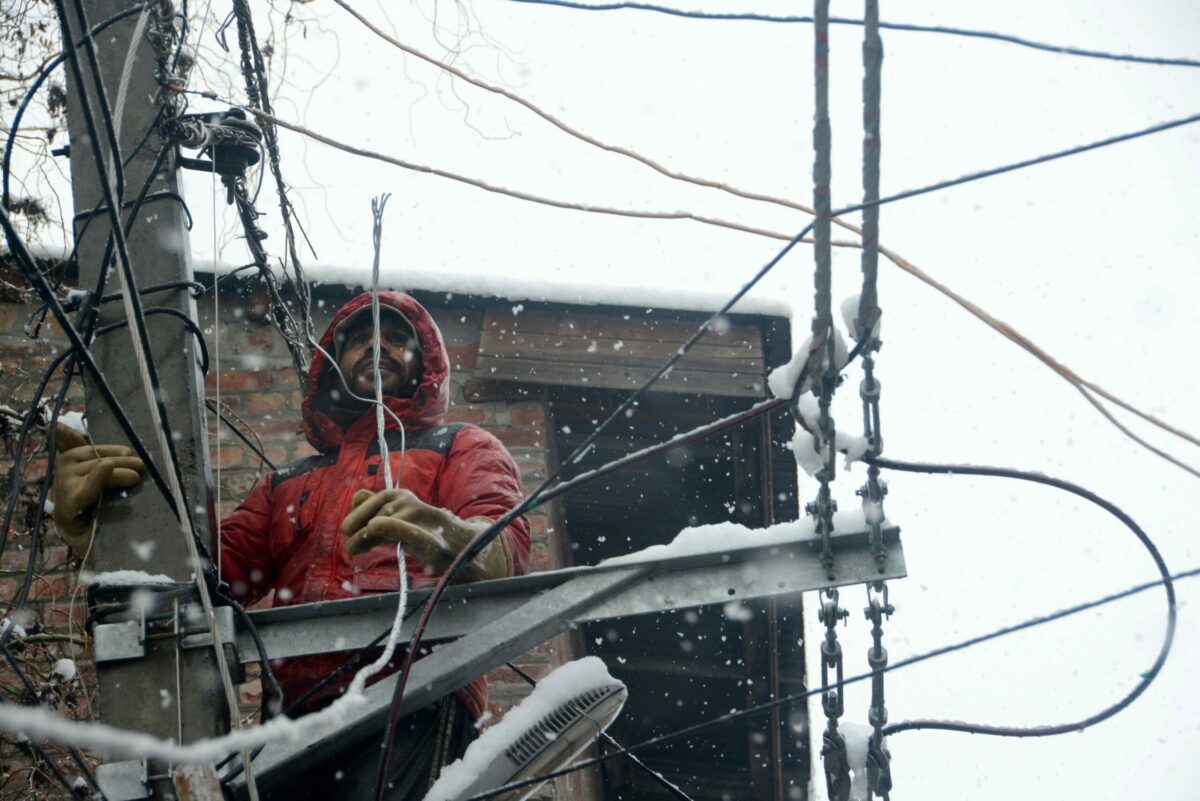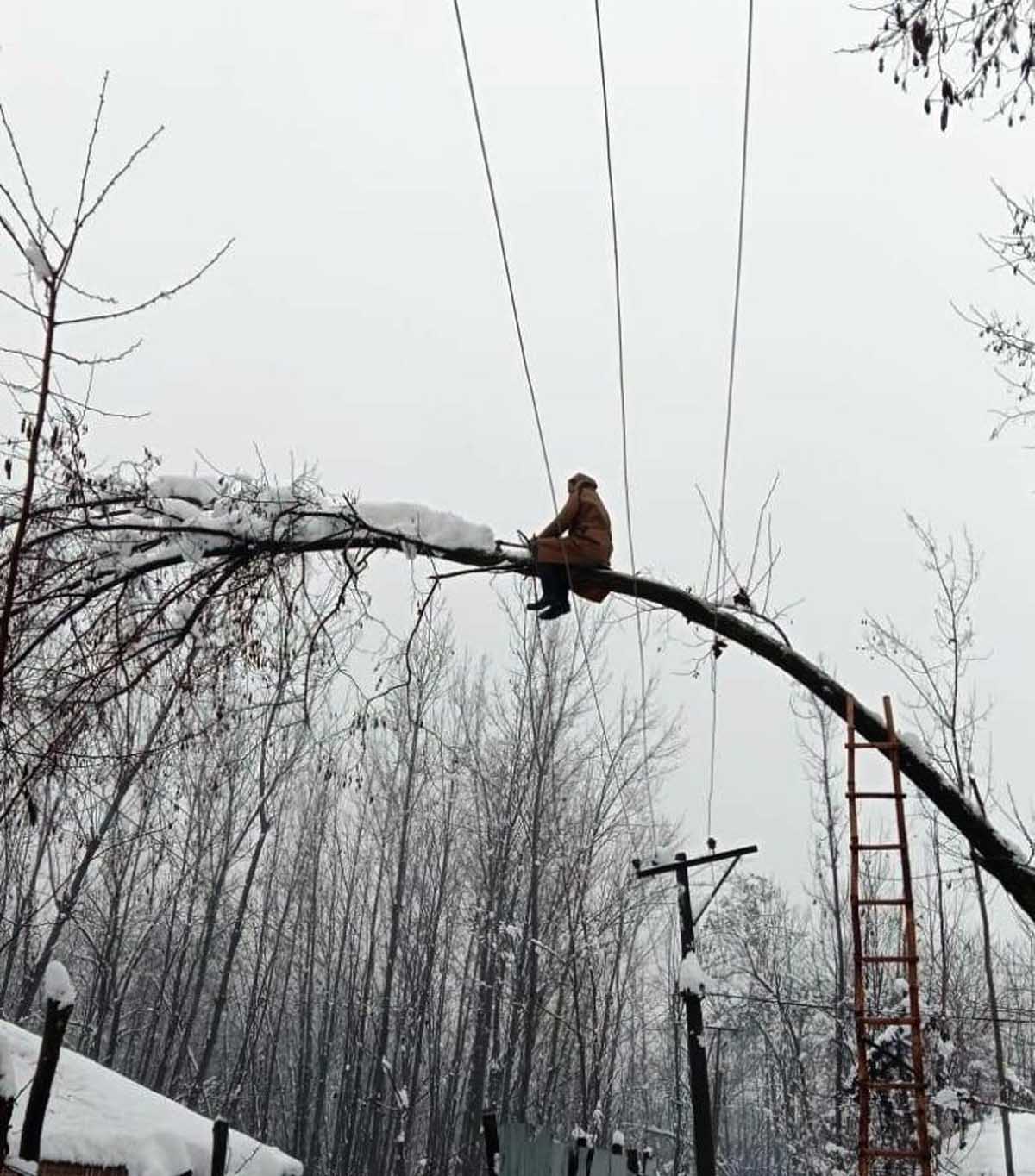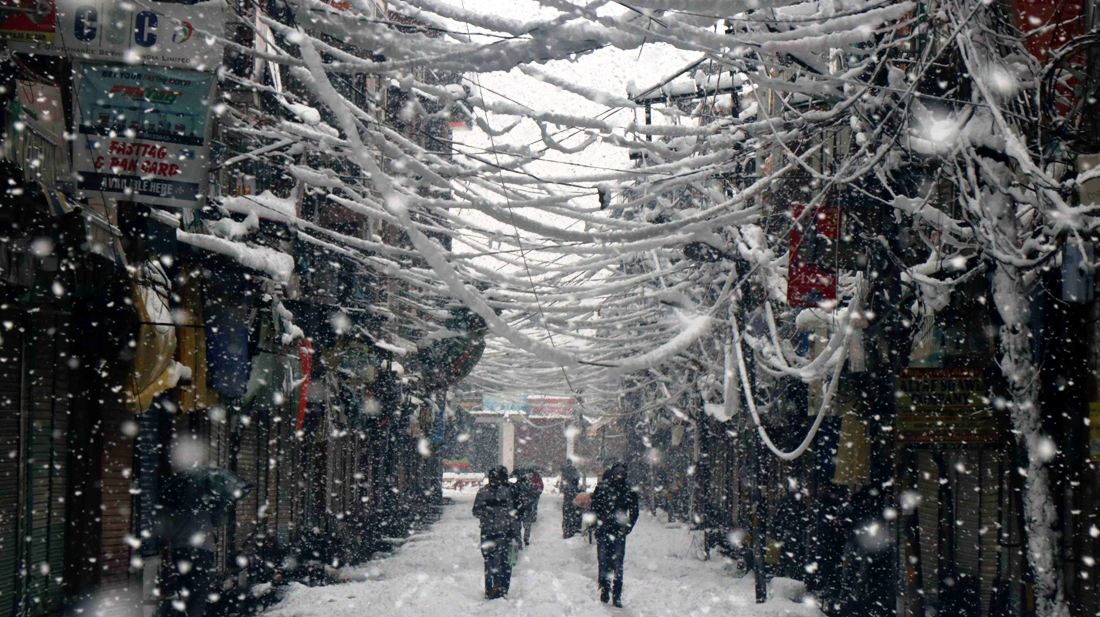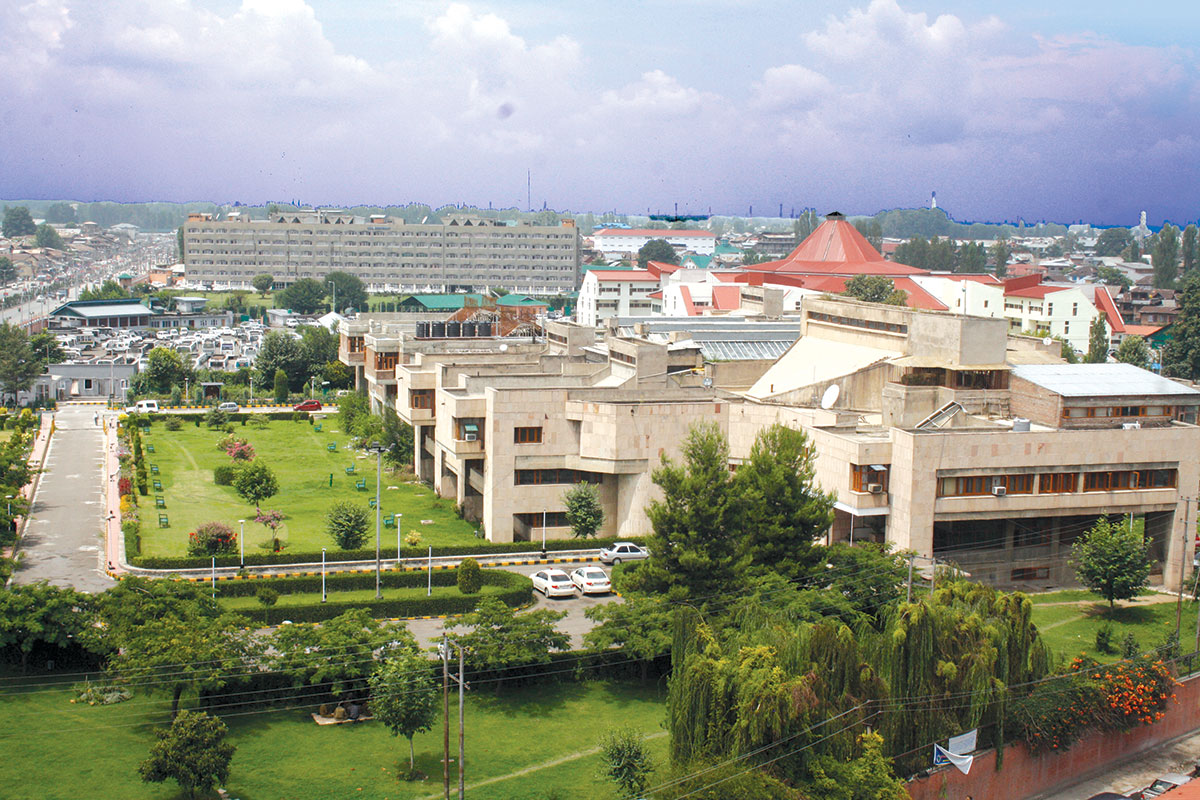Three precious lives were lost to electrocution in Srinagar city, two of them while painting the electric poles, reports Syed Shadab Ali Gillani

The city of Kashmir currently undergoing improvement in the power supply system has witnessed three electrocutions in the last three weeks. The deaths are taking place at a time when the High Court-appointed committee is looking into the issue after taking serious note of the recurrence of such deaths.
On Sunday a worker from Kupwara died of electrocution when he was painting an electric pole near Noora Hospital, in the city outskirts. Identified as Zahoor Ahmed Lone, a resident of Badnambli village in Kupwara district, he was taken to JVC Hospital Bemina for treatment, where the doctors declared him dead on arrival.
A day ahead, a 25-year-old labourer died after getting an electric shock near Srinagar’s P College area. identified as Zubair Ahmed Sheikh, a resident of Dudran, Boniyar in Baramulla, his broad day death pained the residents around.
“He had picked an iron rod on the ground and it touched the electric supply line,” one person said. “It was drizzling and the ground was wet, it could have been a tragedy.”
Witnesses not willing to come on record said Zubair’s colleagues attempted to get an ambulance but failed. They later drove him on a two-wheeler and perhaps they were driving the dead man to hospital.
The two electrocutions in two days came after a similar heart-wrenching death in broad daylight in Baghat on April 11, 2023.
Another Painter
Like Zahoor, this man was also a painter. He was also painting an electric pole under the white-varnishing scheme that the Smart City project is busy with. Identified as Irfan Ahmad Dar, the 25-year-old was atop the pole when an electric shock threw him down almost breaking most of his bones.
Dar belonged to Kuchoor village in Budgam. He had already lost his brother in some accident in Kolkata, according to his father. “He struggled to live for 15 days as doctors said he went into a coma within moments after the shock,” his father said.
Dar had sold part of his inheritance to build a home for his aged parents and brother. He was working overtime to manage his Rs 2.5 lakh debt and then he got an electric shock and died on April 26, 2023, almost after a fortnight-long battle for life. His parents said the tragedy has pushed them into a new cycle of abject poverty and the government must help them.

A Committee
The electrocutions took place within days after the High Court constituted a committee to be led by the Power Commissioner with Chief Engineers of the Department as members to look into these tragedies.
“Deaths due to electrocution and bodily injuries caused by electric shocks are dismissed as mere accidents,” Justice Wasim Sadiq Nargal observed while directing for the constitution of a committee, invoking Article 21 of the Constitution of India. The bench directed to ensure strict adherence to the laws and regulations outlined in the Central Electricity Authority (Measures relating to Safety and Electric Supply) Regulations, 2010, after taking serious note of the rising number of electric shock incidents that frequently result in fatalities. “The huge loss of human life, particularly children, is completely unacceptable, terrible, and heartbreaking. Such tragic tragedies continue to occur in defiance of statutory precautions.”
While awarding compensation of Rs 10 lakh to the family of Jatinder Kumar, a casual labourer, who died while carrying out restoration work on a transformer in Jammu, the court observed that the accident occurred due to non-adherence to safety measures such as local earthing, hand insulating gloves, proper isolation, and other safety measures by the maintenance staff
Notwithstanding the constitution of the Committee, the deaths by electrocution are unabated. These are taking place within and outside Srinagar.
On May 16, a “casual labourer” was repairing a low transmission power supply line in the Brenjan area of Chadoora and died of an electric shock. Identified as
Rafiq Ahmad Dar, the person was disowned by the KPDCL insisting his name does not figure in their records. Nevertheless, human life was lost.
On April 15, a BSNL employee passed away due to electric shocks in Pattan Baramulla. Identified as Mushtaq Ahmad Mir, 48, he was a resident of Tantray Pora Pattan.
In Lidroo belt of Pahalgam, hanging wires put a fire in a cowshed. A young man got in to extinguish the fire and was electrocuted to death. Two others who attempted to rescue him survived with serious burn injuries.
Frequent Deaths
In January 2023, an official document revealed that at least 35 people including ten civilians have lost their lives due to electrocution in Kashmir in the last two years. In 2021, 18 persons lost their lives in 29 accidents and in 2022, 17 persons died in 25 accidents.
Javed Yousuf Dar, the chief engineer of Kashmir Power Distribution Corporation Limited (KPDCL), pointed out that the KPDCL takes these tragic accident incidents very seriously and they have taken a number of actions, including making safety equipment like helmets and safety belts for the workers.
“Our daily wagers under our department, we insure them under two schemes, one is an insurance policy under the prime minister and another is the government ex-gratia fund. The people registered with our labour department, have some coverage through it,” said Javed.

Man Made Tragedies
Almost all these “accidents” are man-made tragedies and clear cases of lack of coordination between the workers and the energy supply points. There has not been any investigation that would hold individuals responsible for the acts of putting the power supply on at a time when the lines are being repaired.
These deaths have brought into sharp focus the KPDCL’s failure in offering some kind of insurance and protective gear to the individuals who risk their lives and repair the supply systems. Over the last few years, some compensation system is in place for people who work in some capacity for the corporation but it is not immediately known if the contractors working for the corporation also have some mechanism in place.
In the direction for constituting the Committee Justice Nargal has emphasised that “any omission by anyone engaged in the activity of supplying such electric energy is liable to compensate for the damage caused to a human life as a result of such energy.”
Compensation
In the absence of a clear system of compensating the families for the tragic deaths of their members in these man-made accidents, litigation remains the only way out. Managingjustice is expensive and it takes years and a lot of effort and resources to manage these cases. Eventually, some of the families who knock on the door of the judiciary seem to get some kind of compensation.
On March 2, 2023, Justice Wasim Sadiq Nargalof the Jammu and Kashmir high Court directed the Power Development Department (PDD) to pay Rs 10 lakh compensation to the mother of Vishal Sharma, a 13-year-old, who died due to electrocution on July 22, 2009. While working in his agriculture fields at Panghor (Gajansoo), he touched a live wire hanging barely 5 ft above the ground and died.

On April 4, 2023, the Division Bench comprising Justices Tashi Rabstan and Rajesh Sekhri upheld the single judge judgment (march 19, 2021) ordering PDD to pay Rs 10 lakh as compensation to Kamlo Devi, whose mason husband Kartar Chand, died of electrocution by high-intensity electric line in 2011 while working on the roof of the house of Puran Chand. The bench regretted that the PDD took 356 weeks in filing objections to the writ petition, least bothered that the petitioner had been hankering from pillar to post for getting compensation on account of the death of her husband due to electrocution due to the negligence of PDD.
On September 14, 2022, Justice Moksha Khajuria Kazmi directed PP to pay Rs 24 lakh to Salima Begum, the widow of Nazir Ahmad Khan, a resident of Uri, who was electrocuted in 2013. He had gone for Maghrib prayers on July 24, 2013, when the wire of an 11000-KV transformer fell over his head and killed him instantly.
On November 25, 2022, Justice Sanjay Dhar awarded a compensation of Rs 24 lakh to Mala Begum, who suffered permanent disability due to electrocution caused by the falling of a 33000 KV power transmission line.
In December 2022, Justice Javaid Iqbal Wani of the Jammu and Kashmir High Court directed PDD, HCC and NHPC to pay Rs 30.20 lakh as compensation to Aatif Irshad Kumar whose kid got crippled because of a 33,000 KV HT shock. A resident of Mantrigam Bandipora, the six-year-old was playing on his home’s third storey when his rod touch the power transmission line. The family was living in the house since 2008 and the transmission line was laid over the house in 2012 and the tragedy struck the family in 2018. The family had objected to the installation of the line over his house and kept it on record. The boy underwent the amputation of his right hand, the thumb of the left hand, and the finger of the right foot, besides burn injuries to the extent of 90 per cent.
On October 7, 2021, Justice Sanjeev Kumar directed a compensation of Rs 3 lakh to the parents of Parvez Ahmad Gujjar, 12, who got electrocuted on June 9, 2008, when he incidentally touched the standing green tree touching a 33-KV electricity transmission line.
Officials, however, said that the department has a system of compensation on vogue already. They refer to the GO 454 of October 24, 2019, which permits the department to offer a compensation of Rs 10 lakh in case of death, Rs 7.50 lakh in case of permanent disability and Rs 2 lakh in case of partial disability in case of electrocutions. It is applicable to officials as well as civilians. Even in the case of domestic animals, the compensation is Rs 20,000 for cow, bull and goat and Rs 5000 for a sheep head. “It is only in cases in which the families are unwilling to take this amount that they go to the court,” one official said.















